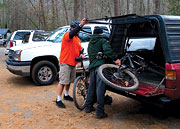
photo by Jonathan Welch
|
The Subaru Outback is to outdoor devotees what the Crown Vic is to the police department, the pimped-out Honda Civic to Patton Aveune cruisers, or, say, the minivan to the Biltmore Park crowd. The Japanese station wagon just might be the ultimate outdoor vehicle for the 21st century. It gets reasonably good gas mileage, it’s all-wheel drive and it’s roomy enough for both gear and people.
Arguably, the car’s popularity owes as much to its image as its practicality. After all, the Outback is the self-proclaimed “official vehicle of the outdoors.” Other car companies have adopted this tactic to market their wares; witness the Toyota FJ Cruiser (“Engineered to Conquer Mother Nature”) or Jeep (“Live Your Own Adventure”).
To be sure, there are more than a few Outbacks in Asheville. Yet, what many locals consider the perfect outdoor vehicle doesn’t always conform to the car industry’s marketing tactics. Take a typical day at the Hardtimes trailhead parking lot at Bent Creek, south of Asheville. On a recent Sunday afternoon, a green Chevy Tahoe, a Honda Odyssey minivan, a late model Mercedes-Benz sedan with a red pinstripe and a “Powered by Biodiesel” bumper sticker, a roomy Ford F-150, a grimy Toyota subcompact, a gleaming new Jeep SUV and, predictably, several Outbacks shared space there.
David Lee, a regular biker at Bent Creek, drives a Ford F-150 — a 1997 four-door crew-cab with a custom-built camper top and enough interior volume to haul six people in comfort, their gear, and, quite possibly, the Toyota Echo parked next to it. An avid outdoorsman, Lee favors his rig for its edge in moving people, bikes and boats to outdoor destination, as well as the occasional load of pine needles from the family farm in Georgia.
In fact, Lee’s truck looks more like it belongs on the farm than the trailhead, but there’s no beating the practicality of its girth. “I saw a similar truck at the Gauley [in West Virginia] some years ago,” says Lee, who bought his own shortly after the sighting. “If there ever was a perfect trip vehicle, that was it.”
But what Lee gains in size he loses in efficiency. Though his truck is a dedicated outdoor vehicle (he drives a fuel-efficient company car to work and occasionally commutes by bike), he acknowledges the “opportunity cost” of exploring the outdoors by bike, boat or foot: Each commute to the woods further burdens Asheville’s already poor air quality.
Still, users of the wilderness who fire up gas-gobbling, smog-belching vehicles may be able to atone for their ways. In lieu of hybrid cars that are generally cramped and pricey, some local drivers have tuned into roomier, late-model diesel vehicles that can run on alternative fuels.
“We still service a lot of Subaru wagons,” says Charley Wilson, owner of the Organic Mechanic in West Asheville, “but we’re also seeing more older diesel models running on biofuel.” If it’s hard to picture a dated Mercedes-Benz appealing to the contemporary outdoor crowd, consider this: Who wouldn’t want to arrive at the put-in behind the wheel of a fine European sedan?
Well, maybe not everyone. And the fact that Wilson has a slew of them in his repair shop may rightfully raise a few eyebrows. “They have great engines that can be rebuilt again and again,” he says, but adds that “some of them are 30 years old and it takes a lot of work to keep them running.”
Though Wilson is a biodiesel consumer himself — he drives a 1975 military lightweight Land Rover — he concedes that there are a few roadblocks to using the fuel. For one, it is currently more costly at the pumps, and, he adds, “biodiesel isn’t the way to go for the least air-quality emissions,” referring to its smog-producing emissions. On the flip side, the domestically brewed fuel contributes fewer greenhouse gasses, reduces our dependence on foreign oil, and, well, simply smells better to most people.
But you don’t have to drive a jalopy to take advantage of this alternative energy source; some are choosing newer, more sophisticated diesel models for their excursions.
Eric Krause is one of them. He has the best of both worlds — his brand new Jeep Liberty CRD can handle rough terrain, runs on alternative fuel and projects an image that would make an auto executive drool. “I can drive to the trail almost guilt free,” says Krause, shortly after finishing a mountain-bike ride. His small-size SUV gets 19 miles per gallon in town and 27 mpg on the highway, and most of the year it runs on 99 percent pure biodiesel.
But Krause, who owns Bio Wheels bike shop in Asheville, has no hesitation when selecting his preferred mode of transportation: It has two wheels and a set of pedals.
[Jack Igelman lives in Asheville.]



Before you comment
The comments section is here to provide a platform for civil dialogue on the issues we face together as a local community. Xpress is committed to offering this platform for all voices, but when the tone of the discussion gets nasty or strays off topic, we believe many people choose not to participate. Xpress editors are determined to moderate comments to ensure a constructive interchange is maintained. All comments judged not to be in keeping with the spirit of civil discourse will be removed and repeat violators will be banned. See here for our terms of service. Thank you for being part of this effort to promote respectful discussion.